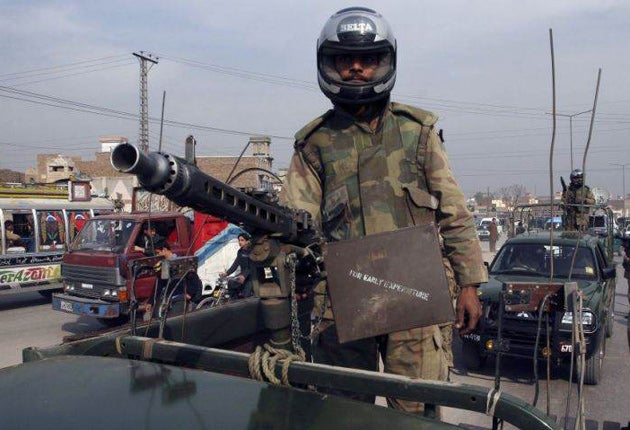Pakistan armed forces 'tried to oust President'
Military still 'calling the shots' in political and judicial process, report reveals

Pakistan's powerful military has actively worked to undermine efforts by the elected government to improve human rights in the country, according to a new report. It also tried to destabilise the elected government, and force out President Asif Ali Zardari.
In a damning critique of the military establishment, Human Rights Watch (HRW) said the armed forces had opposed efforts to end its intervention in the political and judicial process. It had also resisted attempts to locate some of the scores of people who were "disappeared" in the restive province of Baluchistan during the years of General Pervez Musharraf's rule. "The Pakistani military continues to subvert the political and judicial systems in Pakistan," said Ali Dayan Hasan of HRW.
"After eight years of disastrous military rule and in spite of the election of a civilian government, the army appears determined to continue calling the shots in order to ensure that it can continue to perpetrate abuses with impunity," he said.
The travails of Baluchistan represent one of Pakistan's darker but seldom-told narratives. General Musharraf's regime responded to a long-active independence movement with swift brutality. A veteran leader, Nawab Akbar Bugti, was assassinated and untold numbers of suspected activists were either jailed without process or else disappeared. Considered an ally in America's "war on terror", General Musharraf's actions were overlooked or even helped by the West.
Following the election of a civilian government in the spring of 2008 headed by Mr Zardari's Pakistan Peoples Party (PPP), the authorities vowed to end the violence, withdraw troops and release political prisoners. Yet that has not happened. Worse, last April three Baluch leaders were murdered, allegedly by the military-controlled security forces, delivering a damaging blow to the relationship between Mr Zardari's government and the local community.
Mr Hasan said the military continued to hold sway over the province, muzzling local media and undermining reconciliation. "The military needs to recognise that it no longer runs the show," he added.
The report also highlighted how the military worked against Mr Zardari last autumn over a US aid bill, "in an apparent attempt to... force the resignation" of President Zardari. The Kerry-Lugar bill offered $7.5bn, but was opposed by the Pakistani military because of conditions the US attached, in particular that it was satisfied that the armed forces were fighting terrorism and not "subverting the political or judicial processes of Pakistan". Mr Zardari said no one who supported democracy could oppose the objectives of the conditions attached to the aid.
Rasul Bakhsh Rais, a Lahore-based analyst, said Pakistan's military – which has directly ruled the country for half its existence – had become more subtle in the way it intervened. For instance, it had been building a relationship with the Prime Minister Yousaf Gilani as a way of trying to isolate the President. "I think now they are working to counter Mr Zardari, to create checks and balances," he said.
The publication of the report came as the US Defence Secretary Robert Gates made his first visit to Pakistan since 2007, amid pressure from Washington for Pakistan to attack militants based in North Waziristan and blamed for cross-border raids on Western targets inside Afghanistan. Yesterday, a military spokesman said there would be no new offensives for at least six months. Some of the Taliban leaders operating in the territory are alleged to have close ties to ISI, Pakistan's powerful military intelligence agency.
Join our commenting forum
Join thought-provoking conversations, follow other Independent readers and see their replies
Comments
Bookmark popover
Removed from bookmarks